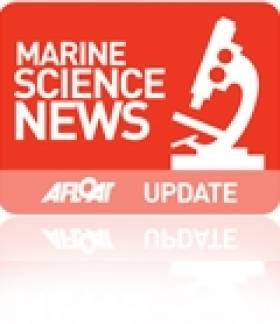Displaying items by tag: Atlantic Forum
#marinescience – The Atlantic Forum taking place at University College Cork over the next two days (4th-5th March 2013) will focus on research and innovation as a driver of blue growth and job creation in the EU Atlantic Area. Participants from Ireland, Spain, Portugal, France and the UK aim to complete an Action Plan for the European Union Atlantic Strategy 2014 -2020. This is the fifth and final workshop in the Atlantic Forum consultation process, during which conferences have already been held in Azores, Brest, Bilbao, and Cardiff as well as an on-line public consultation and the input from a range of stakeholders including the European Parliament, the Committee of the Regions and the Atlantic Regions.
Mr. Simon Coveney, TD, Minister for Agriculture, Food and the Marine opened the event saying, "This is an important and exciting juncture for both Ireland and the EU to put in place an action plan to address the major opportunities associated with our shared Atlantic resource. Ireland has been a proactive supporter of this strategy and action plan contributing through the Government's Marine Coordination Group and represented by the Marine Institute's Dr. Peter Heffernan on the EU's leadership Forum."
The Irish Government has also recognised the important role that Ireland's ocean wealth will play in national recovery and growth. An Integrated Marine Plan for Ireland - Harnessing Our Ocean Wealth, was published last July setting a target of increasing turnover to over €6.4Billion by 2020 (88%) and to double the value of our ocean wealth to 2.4% GDP by 2030.
Mr. Sean Sherlock, TD, Minister of State with responsibility for research and innovation said, "What is clear from today's Atlantic Forum meeting is the centrality and critical role of research and innovation in delivering the Atlantic Action Plan and supporting and developing blue growth and sustainable job creation in the marine and maritime sectors."
Dr. Michael Murphy, President UCC commented that "UCC has an essential role to play in the research and innovation in the maritime sector and this is evidenced by the significant historical levels of funding we have attracted, the major funding we secured for the state-of-the-art Beaufort Laboratory and most recently the major funding award in marine renewable energy from Science Foundation Ireland."
A team from the Commission's Maritime Affairs Directorate, led by Director General Lowri Evans, will present an outline of the draft action plan on Tuesday followed by a discussion on the possibilities for funding the Atlantic Strategy and its implementation and monitoring.
The key overarching themes in the Atlantic Strategy are: Implementing the Ecosystem Approach; Reducing Europe's Carbon Footprint; Exploiting the Atlantic's seafloor resources; Responding to threats & emergencies; and Socially inclusive growth.
The Action Plan for the implementation of the Maritime Strategy for the Atlantic is expected to be adopted by the European Commission in the coming weeks and endorsed by the Council of the European Union during the Irish Presidency, a key priority of the Irish Presidency in the Integrated Maritime Policy area.
Cork To Host Workshop On EU 'Blue Growth' Strategy
#MarineResources - The fifth and final Regional Consultative Atlantic Forum Workshop will be held at University College Cork from 4-5 March 2013.
Following previous workshops in Horta, Brest, Bilbao and Cardiff, the two-day event will input to the definition of the European Union Strategy for the Atlantic Action Plan (2014-2020).
Blue growth and creating sustainable jobs are at the heart of the Atlantic Action Plan, which will focus on harnessing the enormous untapped economic potential of Atlantic coasts, seas and oceans.
According to the Marine Institute, ocean energies, seabed mining, marine biotechnology and other emerging sectors, as well as a revitalisation of traditional activities such as fisheries, aquaculture and tourism – driven by research, technology and innovation – can contribute to the development of a 'blue economy' in Europe that can provide jobs and spur economic growth.
New advances in science and technology place us in a unique position to benefit from the sea's economic potential in a sustainable manner, the institute adds.
Implementation of the Atlantic Action Plan may be co-funded through a variety of member state and EU funds (Cohesion Funds, INTERREG-V, EMFF, Horizon 2020, etc) as well as via the European Investment Bank and Public-Private Partnerships.
The Cork workshop will be opened on Monday 4 March by Marine Minister Simon Coveney and Lowri Evans, EU Director General for Maritime Affairs and Fisheries (director general, MARE). Day 1 will include parallel sessions to address the Research and Innovation and Atlantic Ports components of the Atlantic Action Plan. Day 2 will provide an overview of the Atlantic Action Plan including priorities, funding and implementation.
Speakers will include the director general of MARE and representatives of REGIO, RTD, MOVE, the European Investment Bank, European Parliament, Committee of the Regions, Economic and Social Committee as well as member state and regional representatives.
The Atlantic Action Plan aims to create sustainable jobs and growth by bringing together the five EU countries with an Atlantic coastline (France, Ireland, Portugal, Spain, United Kingdom) plus regional and local authorities, business and other stakeholders to identify key investment and research priorities, as well as concrete co-funded project ideas.
For further information, workshop programme and registration click HERE.
#MARINE RESOURCES - The first event of the Atlantic Forum to inform the EU Strategy for the Atlantic (EUSA) will be held on Faial Island in Portugal's Azores on Friday 21 September.
The inaugural meeting will be held under the them of 'Coastal and Deep Sea Natural Resources'.
According to the Marine Institute, the momentum of the Atlantic Strategy towards 'Blue Growth', enhancing growth and jobs, "will come through the development of marine renewable energies, new visions for aquaculture production, innovative scientific research, promotion of maritime culture and leisure in the Atlantic, including cruising and nautical sports, seabed mining and associated technologies, biotechnologies and greener shipping and an increase in short-sea shipping."
The aim of the Atlantic Forum is to ensure awareness of the EUSA and EU funding processes and to provide stakeholders with a platform to input to the EUSA Action Plan (2014-2020) which will guide the implementation of the EUSA.
The EUSA identifies a number of areas where there is scope for EU-level action to support the coastal and maritime economies of the member states along the Atlantic seaboard.
Interested participants can access further information on the Atlantic Forum, the Azores Meeting, as well as information on the subsequent Atlantic Fora meetings (Brest in October; Bilbao in November; Cardiff in February 2013; and Galway in March 2013) at the European Commission's Maritime Affairs website.






























































